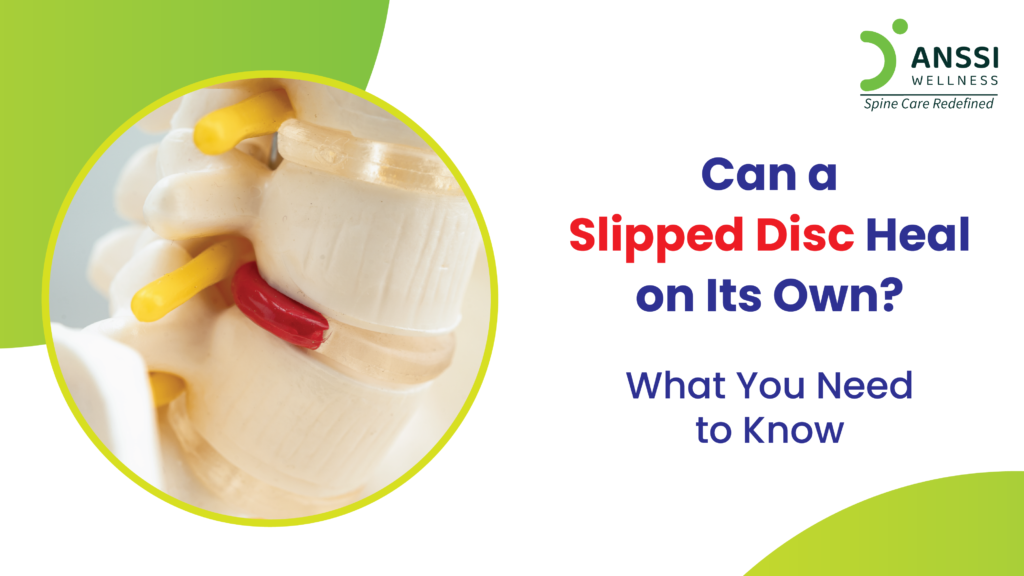A slipped disc, also known as a herniated or prolapsed disc, is a common spinal condition that can cause significant discomfort, including back or neck pain.
It’s a concern that affects people of all ages, particularly those with sedentary lifestyles, heavy lifting habits, or poor posture.
One of the most common questions patients ask is whether a slipped disc can heal on its own or if surgery is the only solution. The good news is that in many cases, with the right care, a slipped disc can heal naturally without the need for invasive procedures.
What Is a Slipped Disc?
The vertebrae, a group of bones that make up your spine, are cushioned by soft discs. These discs act as shock absorbers and allow flexible movement of the spine. A slipped disc occurs when the inner gel-like material of a disc pushes out through a tear or weakness in its outer layer.
This bulging material can press on nearby nerves, causing symptoms such as localised pain, tingling, numbness, or weakness, often radiating to the arms or legs depending on the disc’s location.
But here’s the reassuring part: not all herniated discs cause symptoms, and many people recover without surgery.
Can a Slipped Disc Heal on Its Own?
Yes, in many cases, a slipped disc can heal on its own over time. The human body has an incredible capacity to recover and repair itself. Over the course of several weeks to a few months, the herniated portion of the disc may shrink or be reabsorbed naturally by the body. As the inflammation around the affected nerve subsides and pressure is relieved, symptoms often diminish or disappear completely.
A number of factors affect the degree and rate of healing:
- Severity of the disc herniation
- Location of the slipped disc (cervical, thoracic, or lumbar spine)
- Individual factors like age, activity level, and overall spinal health
Rest and patience are key, but they need to be balanced with the right kind of supportive care to ensure recovery progresses smoothly.
Supportive Non-Surgical Treatments
While rest is important, simply lying in bed for weeks isn’t the answer. Conservative, non-surgical treatments can significantly aid the healing process by reducing inflammation, relieving pressure on the nerve, and strengthening the spine.
Here are some of the most effective non-surgical approaches:
1. Physiotherapy
Targeted physiotherapy helps improve flexibility and strengthen the muscles supporting the spine. Therapists guide patients through exercises that reduce nerve pressure and prevent further injury. Over time, a structured exercise program can also improve posture and spinal alignment.
2. Pain Management
Managing inflammation and pain is crucial during the early stages of recovery. This may involve heat or cold therapy, over-the-counter medications, or prescribed anti-inflammatory drugs. However, these are usually temporary measures and should be part of a broader recovery plan.
3. Posture Correction
Poor posture is a major contributing factor to spinal disc issues. Learning how to sit, stand, and move correctly can prevent further strain on the spine. Ergonomic adjustments at the workplace, using lumbar supports, and maintaining a neutral spine during daily tasks, all play an important role.
4. Lifestyle Changes
Staying active within safe limits, maintaining a healthy weight, avoiding smoking, and incorporating gentle movement throughout the day all contribute to long-term spinal health. Obesity and smoking are known to hinder disc healing and worsen back pain.
5. Non-Surgical Spinal Decompression Treatment
One of the most effective non-surgical treatments for slipped discs is spinal decompression treatment. This technique uses a motorised decompression table to gently stretch the spine. The controlled stretching helps relieve pressure on the spinal discs and creates a healing environment by promoting the movement of water, oxygen, and nutrients into the disc. Clinics like ANSSI Wellness offer advanced spinal decompression based on USA protocols, providing safe and drug-free relief for chronic back and neck pain caused by slipped discs.
When to Seek Help
While most slipped discs improve over time with non-surgical care, there are certain symptoms that require immediate medical attention.
These include:
- Severe or worsening pain that doesn’t improve
- Numbness or weakness in the limbs
- Difficulty walking or balancing
- Loss of bowel or bladder control
These could indicate more serious nerve compression or spinal cord involvement and should be evaluated promptly by a spine specialist.
A timely and accurate diagnosis, typically through a physical exam and imaging tests like an MRI, is crucial to determine the right treatment path and avoid complications.
About ANSSI:
ANSSI Wellness focuses on improving the quality of life for patients suffering from spinal issues, aiming to provide relief where other conventional treatments have failed. Through advanced non-surgical spinal decompression treatment, ANSSI is committed to helping patients avoid surgery and recover in a safe, effective, and compassionate environment.
Connect with ANSSI Wellness on LinkedIn, Instagram, and Facebook for expert guidance.



